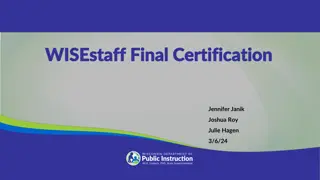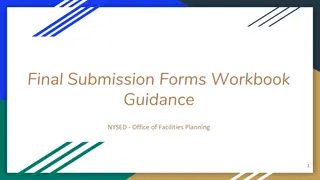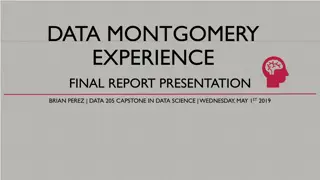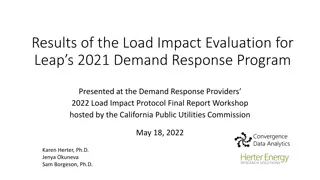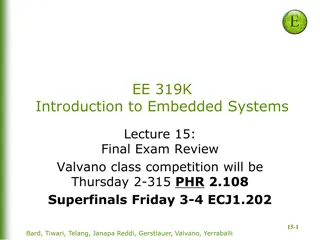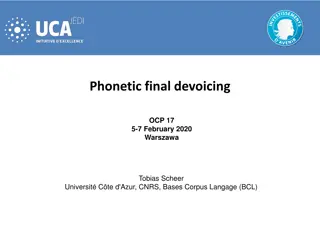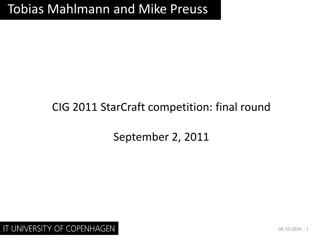
Task Force Meeting and Recommendations for Policy and Training Improvements
Explore the outcomes of the Task Force meeting on 3.5.2021, focusing on key committees such as Executive and Judicial branches. Learn about primary recommendations for policy enhancements in training, addiction treatment, protest guidelines, and more to improve public safety and justice systems.
Download Presentation

Please find below an Image/Link to download the presentation.
The content on the website is provided AS IS for your information and personal use only. It may not be sold, licensed, or shared on other websites without obtaining consent from the author. If you encounter any issues during the download, it is possible that the publisher has removed the file from their server.
You are allowed to download the files provided on this website for personal or commercial use, subject to the condition that they are used lawfully. All files are the property of their respective owners.
The content on the website is provided AS IS for your information and personal use only. It may not be sold, licensed, or shared on other websites without obtaining consent from the author.
E N D
Presentation Transcript
Primary Recommendations Bucket Groups Committee #1 Bucket Description Training Consider how to add training to current curricula in several areas to include implicit bias, CIT, racial equity, SRO, community policing, and protest demonstration. Evaluate current training for BLET, working with partners at JA and Commissions. Policy Addiction as a public health crisis, early intervention, protest policies, use of force, response to individuals with mental illness. Commission Action Present suggestions to Commissions for revision of minimum standards and power of suspension/revocation/denial. Request new rules for use of force, psych exams, transparency, and notification to Commissions of certain issues. Support NCLEA. Request Commissions consider diversity issues. Clemency Promote a Juvenile Review Board to make clemency recommendations. Secure increased funding for Governor s Clemency Office and Parole Commission. Prisons Work with DPS on policies to address flexibility of release dates, increased services for incarcerated persons, transforming use of restrictive housing. Recruitment/Retention Work with stakeholders to draft best practices policy to aid agencies.
Primary Recommendations Policy Bucket Committee #1 Recommendation Next Steps Rec 17: Treat addiction as a public health crisis, including substance use addictions that disproportionately impact Black and brown communities, such as crack cocaine. Host panel discussion to continue conversation. Explore how treatment courts have tracked and reported on equity. Rec 25: Support Task Force on Safer Schools State Action Plan. DPS is currently working on this. TREC will monitor and report on progress. Rec 28: Create and update protest guidelines to consider best practices and First Amendment concerns. Collect existing policies from various agencies and see where those policies align with each other and where there may be missing concepts that need to be implemented. Consider best practices across the country. Identify most important concepts in protest response. Draft sample policy by looking at collected policies and other literature. Check on NCLEA accreditation process and CALEA guidelines. Rec 34: Establish early intervention systems for officers repeatedly violating use of force policies. (See also Rec 31 re: use of force policies, Secondary Responsibility) Gather existing policies from select agencies. Draft sample policy based upon expert input and collected policies. Partner with agencies who don t have policies to draft and implement. Check on NCLEA accreditation process and CALEA guidelines.
Primary Recommendations Judicial Stakeholders Bucket Committee #2 Immediate Prioritization Recommendation Rec. 24: Encourage School Justice Partnerships to reduce students juvenile court involvement Strategy Generate buy-in from key judicial stakeholders Research models already implemented statewide and collect data Advocacy push in conjunction with Youth Justice Awareness Month in October Facilitate creation of School Justice Partnerships in every county Rec. 91: Increase representation of North Carolinians serving on juries through expanded and more frequent sourcing, data transparency, and compensation Support development of methods to mitigate implicit bias on juries and to ensure that juries represent the state s diversity, including (1) procedures to bring jury pools in line with the make-up of a community, (2) videos/trainings for juries aimed at mitigating implicit bias, and (3) more robust data collection and study of jury list formation and removals, racial equity, peremptory strikes, and accessibility of juror pool software. Rec. 93: Provide implicit bias training to all jury system actors Generate buy-in from key judicial stakeholders Rec. 94: Establish a state commission on the jury system, with an eye toward comprehensive reform
Primary Recommendations Judicial Stakeholders Bucket Committee #2 Immediate Prioritization Recommendation Recs 79-83: Bail/pre-trial reform Strategy Generate buy-in from key judicial stakeholders Spread awareness to ensure that local judicial officials feel supported during local implementation Rec. 104: Develop a process to eliminate criminal justice debt Identify existing processes and organizing slate of recommendations Connect with experts at SOG and in other jurisdictions
Primary Recommendations Judicial Stakeholders Bucket Committee #2 Ongoing Efforts Recommendation Rec 84: Require racial equity training for court system personnel, including judges, DAs, and public defenders Rec 88: Enhance prosecutors data collection, technology, training opportunities, and staffing Strategy Work with SOG to develop training and then connect with judicial conferences, Conference of DAs, IDS to generate buy-in. Engage AOC to consider creating standardized requirement. In the interim, support current proposal for a CLE requirement. Identify data needs and best practices through Data Committee and then work with the Conference of DAs on implementation Develop framework for data collection on charging decisions, including status offenses and felony plea offers Engage AOC as appropriate to strategize on data-housing 101: Assess a defendant s ability to pay prior to levying any fines and fees Review existing forms and research utilization in districts across the state Work with stakeholders to modify existing forms when necessary Research model deployed in Mecklenburg and elsewhere for assessing ability to pay
Primary Recommendations Prosecutorial Stakeholder Bucket Committee #2 Immediate Prioritization Recommendation Strategy Rec 84: Require racial equity training for court system personnel, including judges, DAs, and public defenders Work with SoG and CODA to create and expand racial equity training offerings Draft and distribute pledge to train Rec 87: Educate prosecutors, their staff, and officers of justice on unconscious bias in the criminal justice process and prosecutorial decision-making Develop understanding of authority of relevant stakeholders to mandate training Work with CoDAs to create unconscious bias training program Rec 89: Study and adopt evidence-based reforms for reducing and eventually eliminating racial disparities in charging decisions and prosecutorial outcomes Research progress in Orange County progress Develop education campaign aimed at encouraging local prosecutors to adopt reforms Explore partnership with local policy committee to work on grant funding Rec 90: Establish working groups led by district attorneys to review and approve every habitual felony charging decision Work with CoDAs to identify and develop a model to be used across all districts in NC
Primary Recommendations Prosecutorial Stakeholder Bucket Committee #2 Ongoing Efforts Recommendation Strategy 101: Assess a defendant s ability to pay prior to levying any fines and fees Review Mecklenburg bench card implementation Connect with SoG about status of their work 104: Develop a process to eliminate criminal justice debt Identify existing processes and national models Organize slate of recommendations. Rec 112: Eliminate the future use of Violent Habitual Felony Status Collect data on pre- and post-reform habitual felon status (possible partnership with Data Committee) Rec 113: Eliminate future use of Habitual Felony Status for individuals under the age of 21 or convicted of non-violent drug offenses Rec 114: Amend the habitual felony statute to limit the look back period to within 8 years of the charged offense Rec 116: Review all future sentences after 20 years or before Research existing models, including state and federal legislative efforts
Primary Recommendations Referrals to Data and Communications Committee #2 Data, Studies, and Evaluation Rec 88: Enhance prosecutors data collection, technology, training opportunities, and staffing Rec 115: Analyze and report on racial disparities in sentencing laws and recommend possible changes Communications and Public Education Rec 97: Establish a Second Look Act to reduce racially disparate sentences through the review and action of those currently incarcerated Rec 111: Broaden the use of Advanced Supervised Release Rec 117: Prohibit capital punishment for people with serious mental illness and people 21 or younger at the time of the offense and prohibit the use of juvenile adjudications to be considered as aggravating factors
Primary Recommendations Committee #4 Overview of Process to Date Reviewed and discussed assigned recommendations Referred several to data and communications committees Surveyed police chiefs and sheriffs regarding co-responder/alternative responder programs Identified next steps and stakeholders for remaining recommendations Decided to put in "buckets" by single most important stakeholder Polled group to begin prioritization within buckets
Primary Recommendations Committee #4 Data and Communications Referrals Data: Rec 11: Use data and objective criteria, instead of officers' subjective perceptions and beliefs, to drive the level of police presence in neighborhoods Rec 15: Restrict state law enforcement use of asset forfeiture on low-level seizures where there is no conviction Communications: Rec 61: Establish and fund restorative justice programs in local communities across the state and at various points of the criminal justice system Rec 62: Form a victim advisory group to help develop restorative justice programs and other equity programs for crime victims
Primary Recommendations Committee #4 Stakeholder Buckets Law Enforcement Agency Heads; Chiefs Association; Sheriffs Association Rec 6: Adopt community policing philosophies and plans in collaboration with the communities law enforcement serves Also in victims/community bucket Rec 8: Encourage or require officers to spend non-enforcement time, or live in, the neighborhoods they serve Rec 9: Publicly acknowledge mistakes by law enforcement to build trust and transparency Rec 11: Use data and objective criteria, instead of officers' subjective perceptions and beliefs, to drive the level of police presence in neighborhoods With data team for questions Rec 12: Deemphasize felony drug possession arrests for trace quantities under .25 grams Judicial committee will approach this with and through the DAs Rec 13: Prioritize traffic stops that improve traffic safety Rec 14: Require all consent searches to be based on written, informed consent Rec 18: Encourage citations and summons in lieu of arrest whenever possible Rec 21: Develop inclusive processes for selecting and overseeing SROs Also in victims/community bucket Rec 71: Deprioritize marijuana-related arrests and prosecution
Primary Recommendations Committee #4 Stakeholder Buckets Local Government City Councils; League of Municipalities; County Commissions; Association of County Commissioners; Association of Local Health Departments Rec 1: Respond more appropriately to situations concerning mental illness, autism, intellectual disabilities, substance abuse, homelessness, and other non-emergency situations Rec 3: Fund grassroots organizations that employ promising and peaceful strategies to help communities promote public safety Rec 5: Form local Community Safety and Wellness Task Forces to examine public safety and wellness needs Also in victims/community bucket Rec 16: Establish and expand access to diversion programs Judicial committee will approach this with and through the DAs Rec 19: Hire behavioral health professionals in schools Rec 20: Fund school personnel training on mental health, first aid, cultural competence/diversity/inclusion, and developmental disability Rec 83: Create independent pretrial services and improve data collection
Primary Recommendations Committee #4 Stakeholder Buckets Victims/Community Voices & Organizations United Way; National Association of Social Workers; NC CRED; NC CASA; Our Voice; NC VAN; Forward Justice; PTAs Rec 4: Develop and provide funding to help communities build violence prevention programs Rec 6: Adopt community policing philosophies and plans in collaboration with the communities law enforcement serves Also in law enforcement bucket Rec 21: Develop inclusive processes for selecting and overseeing SROs Also in law enforcement bucket Rec 61: Establish and fund restorative justice programs in local communities across the state and at various points of the criminal justice system Rec 62: Form a victim advisory group to help develop restorative justice programs and other equity programs for crime victims Rec 5: Form local Community Safety and Wellness Task Forces to examine public safety and wellness needs Also in local government bucket
Primary Recommendations Committee #4 Stakeholder Buckets Grantmakers Rec 1: Respond more appropriately to situations concerning mental illness, autism, intellectual disabilities, substance abuse, homelessness, and other non-emergency situations (local government) Rec 3: Fund grassroots organizations that employ promising and peaceful strategies to help communities promote public safety (local government) Rec 4: Develop and provide funding to help communities build violence prevention programs (victims/community) Rec 61: Establish and fund restorative justice programs in local communities across the state and at various points of the criminal justice system (victims/community)
Primary Recommendations Committee #4 Survey of Police Chiefs and Sheriffs Survey sent to police chiefs this week by CJ Standards and Sheriffs' Standards Closes today, so these are interim results Asked about: Prevalence co-responder models, alternate responder models Successes of current programs Barriers to starting these programs As of yesterday afternoon, we received responses from 240 law enforcement agencies in 80 counties across North Carolina 36 Have a co-responder or alternative responder program 26 more are planning to start one 162 want to learn more about these programs 42 have a specially-trained crisis response unit 35 would prefer to have more officers trained for their unit



